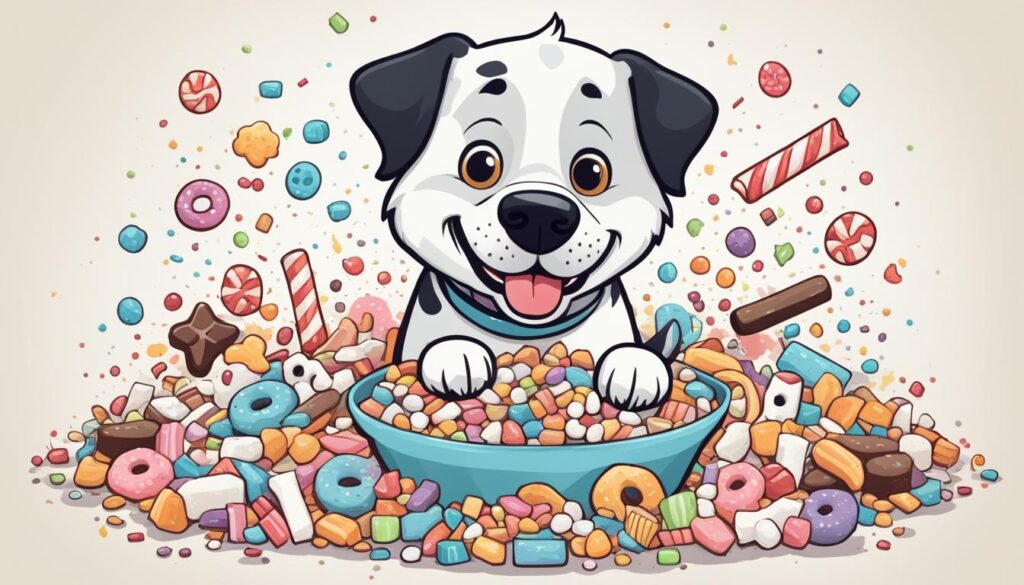When it comes to dog nutrition, it’s essential to pay attention to what we feed our furry friends. While dogs can technically consume some types of sugar, it’s important to understand the potential risks and make informed decisions about their diet. In this article, I’ll delve into the topic of brown sugar and its safety for dogs, providing insights from veterinary professionals.
Brown sugar, like any other type of sugar, should generally be avoided when it comes to feeding our dogs. While complex carbohydrates are a part of their diet, raw or refined simple sugars can have harmful effects on their health. It’s crucial to consider the impact of sugar consumption on their overall wellbeing.
Before we explore safe alternatives to brown sugar for dogs, let’s take a closer look at the types of sugar that dogs can and shouldn’t eat. Understanding the differences can help us make better choices for our furry companions.
Key Takeaways:
- Dogs can consume some types of sugar, but it’s best to avoid raw or refined simple sugars.
- Artificial sweeteners like Xylitol are toxic to dogs and should never be given to them.
- Complex carbohydrates and fructose from sources like dog food and certain fruits can be part of a balanced canine diet.
- It’s crucial to consult with a veterinarian for personalized guidance on dog nutrition and treats.
- Maintaining a healthy and safe diet for our dogs is essential for their overall well-being.
Types of Sugar Dogs Can and Shouldn’t Eat

Dogs can enjoy certain types of sugar in limited amounts, but it’s essential to understand which sugars are safe and which can be toxic to them. Here are some types of sugar that dogs can and shouldn’t consume:
Safe Sugar for Dogs
Dogs can have granulated sugar in small quantities as part of certain food products or treats. However, it’s crucial to remember that moderation is key. Excessive sugar consumption can lead to various health issues in dogs, such as obesity and dental problems.
When it comes to natural sugars, fructose, which is found in fruits, is generally safe for dogs in moderation. Fruits like apples, bananas, and berries can be a healthy and enjoyable addition to a dog’s diet.
Toxic Sugar for Dogs
While some sugars are safe for dogs, others can be highly toxic and even life-threatening. One such sugar substitute is Xylitol, commonly found in sugar-free products like chewing gum and baked goods. It’s essential to keep any food containing Xylitol away from dogs, as even a small amount can cause severe hypoglycemia, liver damage, and potential death.
Other toxic sugars for dogs include artificial sweeteners like aspartame, saccharin, and sucralose. These can be found in various products labeled as “sugar-free” or “diet,” and their consumption should be strictly avoided.
Dog-Friendly Sweeteners
If you’re looking for dog-friendly sweeteners, there are some natural alternatives that can be used in moderation. Here are a few:
- Honey: Honey can be a natural and healthier sweetener for dogs, as it contains vitamins, minerals, and antioxidants. However, it should only be given in small amounts and never to puppies under one year old or dogs with certain health conditions.
- Stevia: Stevia, a plant-based sweetener, is generally safe for dogs in minimal amounts. It’s important to choose a pure form of stevia without any additional additives or sugar alcohols.
When incorporating any sweeteners into your dog’s diet, it’s crucial to consult with your veterinarian to ensure the safety and appropriateness for your individual dog’s health and specific dietary needs.
| Type of Sugar | Safety Level for Dogs |
|---|---|
| Granulated Sugar | Safe in small quantities |
| Fructose (from fruits) | Safe in moderation |
| Xylitol | Highly toxic and should be avoided |
| Artificial sweeteners | Highly toxic and should be avoided |
| Honey | Safe in small amounts |
| Stevia | Safe in minimal amounts |
The Role of Sugar in a Dog’s Diet

When it comes to a dog’s diet, complex carbohydrates from dog food play a crucial role in providing them with a source of energy, alongside protein and fat. While dogs do not have a specific minimum daily carbohydrate requirement, moderation is key. Carbohydrates, including sugar, can offer certain benefits to dogs if included appropriately. However, it’s essential to understand that carbohydrates are not essential to their diet.
The amount of carbohydrates in dog food can vary significantly, with some formulas containing between 30% and 70% carbohydrates. Dogs have the ability to digest and utilize carbohydrates as a source of energy. However, it’s important to note that the nutritional value of sugar for dogs is not as significant compared to other sources of carbohydrates.
| Carbohydrate Type | Sources | Nutritional Value for Dogs |
|---|---|---|
| Complex Carbohydrates | Whole grains, vegetables | Provides sustained energy |
| Sugar | Table sugar, brown sugar | Limited nutritional value |
Sugar, including natural sugars found in fruits, can be part of a well-rounded canine diet if given in moderation. However, it’s important to prioritize complex carbohydrates over simple sugars. While dogs can benefit from some carbohydrates, it’s crucial to ensure that their overall diet meets their specific needs and is balanced with appropriate proportions of protein, fat, and other essential nutrients.
The Health Consequences of Too Much Sugar for Dogs
Excess sugar can have detrimental effects on a dog’s health. From upset stomachs to weight gain and even diabetes, the risks associated with sugar consumption in dogs should not be underestimated.
Dogs are prone to experiencing stomach issues such as diarrhea, vomiting, and gas when they consume too much sugar. These uncomfortable symptoms can cause distress and discomfort for our furry friends.
In addition to digestive problems, sugar can also contribute to weight gain in dogs. Just like humans, excessive sugar intake can lead to obesity in dogs, which can have serious implications for their overall well-being. Obese dogs may develop joint pain, heart problems, and breathing difficulties as a result of their increased weight.
Furthermore, dental problems are another consequence of sugar consumption in dogs. Sugar can promote the growth of bacteria in their mouths, leading to plaque buildup, tooth decay, and gum disease.
Although there isn’t enough evidence to definitively say that sugar directly causes diabetes in dogs, it is considered a risk factor for the disease. Dogs with diabetes often require specialized diets and medical care to manage their condition.
Preventing the Health Risks
As responsible pet owners, it is crucial to be mindful of the amount of sugar we give to our dogs. Minimizing their sugar intake can help prevent these health risks and ensure their overall well-being.
Feeding our dogs a balanced and nutritious diet is key to maintaining their health. Choosing dog-friendly treats and snacks that are low in sugar or sugar-free is a wise choice. Opting for natural, quality ingredients can provide a healthier alternative to commercially available treats that may be high in sugar.
Regular dental care, including brushing their teeth and providing suitable chew toys, is essential for combatting dental issues caused by sugar. Additionally, scheduling regular veterinary check-ups can help identify and address any health concerns related to sugar consumption or other factors.
| Health Risks of Sugar for Dogs | Sugar-Related Health Issues in Dogs | Sugar and Weight Gain in Dogs | Dental Problems Caused by Sugar in Dogs | Sugar and Diabetes in Dogs |
|---|---|---|---|---|
| Upset stomach | Obesity | Plaque buildup | Diabetes risk factor | |
| Diarrhea | Joint pain | Tooth decay | ||
| Vomiting | Heart problems | Gum disease | ||
| Gas | Breathing difficulties |
It is crucial to prioritize our dogs’ health by being mindful of their sugar consumption. By taking proactive measures to limit sugar intake and provide proper dental care, we can help our beloved pets live long, healthy lives.
Cinnamon and Dogs: Safe or Dangerous?
Cinnamon is generally considered safe for dogs in small amounts, but excessive consumption or inhalation can be harmful. Ingesting more than a teaspoon of cinnamon powder or a small drop of cinnamon essential oil can be toxic for most pets. Eating cinnamon powder or chewing on cinnamon sticks can cause skin irritations, redness in the mouth, low blood sugar, liver disease, vomiting, diarrhea, and changes in heart rate. It’s important to keep cinnamon products away from dogs and contact a veterinarian if ingestion or inhalation occurs.
Cinnamon Treats for Dogs: Are They Safe?

Cinnamon can be a safe and beneficial ingredient when baked into dog treats in small amounts. Many dog treats include cinnamon for its potential health benefits and antioxidant properties.
One of the main advantages of cinnamon in dog treats is its antioxidant content. Antioxidants help protect cells from damage caused by harmful molecules called free radicals. Including cinnamon in dog treats can provide a natural and flavorful way to incorporate antioxidants into your dog’s diet.
However, it’s important to note that the safety and suitability of cinnamon treats can vary depending on the individual dog’s health and dietary needs. Before introducing cinnamon treats into your dog’s regular diet, it’s best to consult with a veterinarian to ensure it aligns with their specific dietary requirements.
While cinnamon can be a healthy addition to dog treats, it’s crucial to avoid potential risks associated with excessive consumption. Too much cinnamon can lead to various health issues in dogs, such as irritations, low blood sugar, liver disease, vomiting, diarrhea, and changes in heart rate.
To provide a balanced and safe diet for your furry friend, consider these key points:
- Consult with a veterinarian before introducing cinnamon treats into your dog’s diet.
- Ensure that the amount of cinnamon in the treats is appropriate for your dog’s size and individual health considerations.
- Monitor your dog for any adverse reactions or sensitivities to cinnamon.
- Always read the ingredient labels of commercial cinnamon treats to ensure they are free from harmful additives or excessive amounts of cinnamon.
To illustrate the potential benefits and risks of cinnamon in dog treats, here is a comprehensive table:
| Treat Brand | Ingredients | Cinnamon Content | Benefits | Risks |
|---|---|---|---|---|
| Brand A | Chicken, Brown Rice, Cinnamon | 1 teaspoon | Antioxidant support | Potential stomach irritation if consumed in excess |
| Brand B | Peanut Butter, Oats, Caramel, Cinnamon | 1/2 teaspoon | Improved digestive health | Possible allergic reactions to cinnamon |
| Brand C | Turkey, Quinoa, Sweet Potato, Cinnamon | 1/4 teaspoon | Anti-inflammatory properties | Can cause low blood sugar levels if consumed excessively |
Remember, every dog is unique, and what works for one may not work for another. It’s crucial to prioritize your dog’s health and consult with a professional to determine the appropriate use and dosage of cinnamon treats for your furry companion.
Can Dogs Eat Cinnamon Rolls or Cinnamon Bread?

Dogs should not be fed cinnamon rolls or cinnamon bread. These foods can pose several dangers to dogs and should be avoided.
Cinnamon rolls and cinnamon bread often contain ingredients that are toxic to dogs, such as nutmeg, raisins, and xylitol. Nutmeg can cause gastrointestinal issues and nervous system problems in dogs, while raisins can lead to kidney failure. Xylitol, an artificial sweetener commonly used in baked goods, is highly toxic to dogs and can cause a rapid drop in blood sugar levels and liver damage.
In addition to the toxic ingredients, cinnamon rolls and cinnamon bread are high in fat, sugar, and butter. Feeding these foods to dogs regularly can contribute to obesity, which can lead to numerous health problems such as joint pain, heart disease, and diabetes. The high sugar content can also increase the risk of dental issues, including tooth decay and gum disease.
Furthermore, raw cinnamon roll dough or bread dough can be dangerous for dogs. Yeast in the dough can ferment and produce alcohol, leading to alcohol poisoning in dogs. The expanding dough can also cause a life-threatening condition called bloating or gastric dilation-volvulus.
It is important to prioritize the health and safety of dogs by providing them with a balanced and appropriate diet. Instead of feeding cinnamon rolls or cinnamon bread, opt for dog-friendly treats and snacks that are specifically formulated for their nutritional needs.
Safe Amount of Cinnamon for Dogs

The safe amount of cinnamon for dogs depends on their size and individual health factors. It is important to consult with a veterinarian to determine the appropriate dosage of cinnamon for a specific dog. Commercial dog treats generally contain safe amounts of cinnamon, but it’s best to check with a vet for personalized recommendations.
Cinnamon can have some potential health benefits for dogs when consumed in moderation. It may help improve digestion and act as a natural antioxidant. However, excessive consumption of cinnamon can be harmful to dogs and may lead to various health problems.
When considering the amount of cinnamon to give to your dog, it is essential to take into account their size and any underlying health conditions they may have. Dogs with certain medical conditions, such as liver disease or diabetes, may have different considerations when it comes to cinnamon consumption.
While there are no established guidelines for the safe amount of cinnamon for dogs, it is generally recommended to start with a minimal dosage and observe your dog’s reaction. If there are no adverse effects, you can gradually increase the quantity but always under the guidance of a veterinarian.
It’s important to note that cinnamon should never be given to dogs in its essential oil form, as it can be highly concentrated and potentially toxic. Stick to using small amounts of cinnamon powder in moderation.
“Consulting with a veterinarian is crucial to ensure the safety and well-being of your dog when introducing cinnamon into their diet. They can provide specific recommendations based on your dog’s individual needs.”
| Dog Size | Recommended Cinnamon Dosage |
|---|---|
| Small | Up to 1/8 teaspoon once a day |
| Medium | Up to 1/4 teaspoon once a day |
| Large | Up to 1/2 teaspoon once a day |
What to Do if Your Dog Eats Cinnamon

If your dog ingests excessive amounts of cinnamon or shows signs of cinnamon toxicity, it is crucial to take immediate action. Contacting a veterinarian is essential to ensure the well-being of your furry friend. Symptoms of cinnamon ingestion in dogs may include coughing, choking, difficulty breathing, skin irritations, low blood sugar, liver disease, vomiting, diarrhea, and changes in heart rate.
When dealing with a potential cinnamon toxicity situation, professional veterinary care may be necessary to address any toxic effects and provide appropriate treatment. It is crucial to consult with a veterinarian who can assess your dog’s condition and recommend the necessary steps to mitigate any potential harm from the ingestion of cinnamon.
Remember, swift action and expert guidance are key when it comes to your dog’s health. Do not hesitate to reach out to a veterinarian if you suspect that your dog has consumed cinnamon in excessive amounts or is displaying any symptoms of cinnamon toxicity.
Seek immediate veterinary attention if your dog ingests excessive cinnamon or shows signs of cinnamon toxicity. Early intervention can help prevent further complications and ensure your pet’s well-being.
Preventing Cinnamon Toxicity in Dogs
When it comes to keeping our dogs safe, it’s essential to take the necessary precautions to prevent cinnamon toxicity. Dogs should not ingest, inhale, or come into contact with unsafe amounts of cinnamon, as it can have harmful effects on their health. To ensure the safety of our furry friends, there are several measures we can take:
- Keep cinnamon essential oils and cinnamon sticks out of their reach: These concentrated forms of cinnamon can be particularly dangerous for dogs if consumed or chewed on. It’s best to store them securely in a high place where pets cannot access them.
- Store cinnamon and other spices in high places: Regular cinnamon powder used for baking or cooking should also be stored out of reach to prevent accidental ingestion by dogs.
- Be cautious with cinnamon-containing products like cider: While some foods and beverages may contain cinnamon, it’s important to read the ingredients carefully and avoid feeding them to dogs without the guidance of a veterinarian.
If your dog does happen to consume or inhale cinnamon, it is crucial to seek immediate veterinary attention. Professional care can help minimize the potential effects and ensure your dog’s well-being.
Remember, prevention is key when it comes to cinnamon toxicity in dogs. By taking these safety precautions, we can keep our furry companions safe and healthy.
Avoiding Exposure to Cinnamon: Safety Precautions
| Safety Precautions | Description |
|---|---|
| Keep cinnamon essential oils and sticks out of reach | Avoid potential ingestion or chewing on concentrated forms of cinnamon |
| Store cinnamon and other spices in high places | Prevent accidental ingestion by storing cinnamon powder securely |
| Exercise caution with cinnamon-containing products | Read ingredient labels and consult a veterinarian before feeding cinnamon-containing foods or beverages |
Wrapping Up
In conclusion, when it comes to dogs and sugar consumption, it’s important to exercise caution. While dogs can technically consume some types of sugar, it’s best to avoid raw or refined simple sugars and artificial sweeteners like Xylitol. Instead, complex carbohydrates and fructose from sources like dog food and certain fruits can be included in a balanced canine diet in moderate amounts.
When it comes to cinnamon, it can be safe for dogs in small quantities. However, excessive consumption or inhalation of cinnamon can be harmful and may lead to various health issues. It’s crucial to consult with a veterinarian before introducing cinnamon or any new food to a dog’s diet to ensure their safety and well-being.
To summarize the key takeaways:
- Avoid raw or refined simple sugars and artificial sweeteners in a dog’s diet.
- Complex carbohydrates and fructose from dog food and certain fruits can be included in moderation.
- Cinnamon can be safe for dogs in small amounts but should be used cautiously.
- Consult with a veterinarian before introducing cinnamon or any new food to a dog’s diet.
By following these guidelines, dog owners can ensure that their pets maintain a healthy and balanced diet while minimizing potential risks associated with sugar consumption and cinnamon ingestion.
Sugar Consumption and Cinnamon Safety for Dogs
| Sugar | Safety for Dogs |
|---|---|
| Complex carbohydrates (dog food) | Generally safe in moderation |
| Fructose (fruits) | Safe in moderation |
| Raw or refined simple sugars | Best to avoid |
| Artificial sweeteners (Xylitol) | Toxic and should be avoided |
| Cinnamon | Safe in small amounts; excessive consumption or inhalation can be harmful |
Wrapping Up
Ensuring your dog’s safety and health when it comes to their diet is crucial. Key takeaways on sugar consumption for dogs and final thoughts on dogs and cinnamon can help guide you in providing the best nutrition for your furry friend.
Dogs should be fed a balanced and appropriate diet that meets their nutritional needs. While dogs can technically eat some types of sugar, it’s important to avoid raw or refined simple sugars and artificial sweeteners like Xylitol. Complex carbohydrates and fructose from dog food and certain fruits can be part of a balanced canine diet but should be consumed in moderation.
When it comes to cinnamon, small amounts can be safe for dogs. However, excessive consumption or inhalation of cinnamon can be harmful. It is always best to consult with a veterinarian before introducing cinnamon or any new food to your dog’s diet. Your veterinarian can provide personalized guidance based on your dog’s individual health and dietary needs.
Remember, providing a healthy and safe diet for your dog is essential for their overall well-being. By feeding them the right foods in the right amounts and consulting with a veterinarian, you can ensure that your dog’s dietary needs are met and they can live a happy and healthy life.
FAQ
Can dogs have brown sugar?
Dogs can technically eat some types of sugar, but it’s best to avoid raw or refined simple sugars and artificial sweeteners like Xylitol. Brown sugar falls into the category of refined sugar and should be avoided in a dog’s diet.
What types of sugar can dogs eat?
Dogs can consume complex carbohydrates from sources like dog food, as well as fructose found in certain fruits. These sugars should be consumed in moderation and as part of a well-rounded canine diet.
What are the health consequences of too much sugar for dogs?
Excess sugar consumption can lead to stomach issues, dental problems, weight gain, and potentially contribute to diabetes in dogs. It’s important to monitor your dog’s sugar intake to maintain their overall health.
Is cinnamon safe for dogs?
Cinnamon can be safe for dogs in small amounts, but excessive consumption or inhalation can be harmful. It’s important to keep cinnamon products out of reach and consult a veterinarian before introducing cinnamon to a dog’s diet.
Can dogs eat cinnamon rolls or cinnamon bread?
Dogs should not be fed cinnamon rolls or cinnamon bread. These foods often contain toxic ingredients for dogs, such as nutmeg, raisins, and xylitol. Additionally, they are high in fat and sugar, which can be unhealthy for dogs.
What is the safe amount of cinnamon for dogs?
The safe amount of cinnamon for dogs depends on their size and individual health factors. It’s best to consult with a veterinarian to determine the appropriate dosage of cinnamon for a specific dog.
What should I do if my dog eats cinnamon?
If a dog ingests excessive amounts of cinnamon or shows signs of cinnamon toxicity, it is important to contact a veterinarian immediately. Veterinary care may be necessary to address any potential toxic effects and provide appropriate treatment.
How can I prevent cinnamon toxicity in dogs?
The best way to prevent cinnamon toxicity in dogs is to ensure they do not ingest, inhale, or come into contact with unsafe amounts of cinnamon. It’s important to keep cinnamon products out of their reach and seek immediate veterinary attention if ingestion or inhalation occurs.
Can dogs have sugar substitutes?
No, dogs should not be given artificial sweeteners like Xylitol, as they can be toxic and potentially deadly. Stick to natural sugars found in fruits and complex carbohydrates from dog food.
What is the role of sugar in a dog’s diet?
Sugar, specifically complex carbohydrates, can provide a source of energy for dogs alongside protein and fat. While dogs do not have a minimum daily carbohydrate requirement, incorporating carbohydrates in moderation can have some benefits.
What are some safe alternatives to brown sugar for dogs?
Instead of giving dogs brown sugar, consider offering healthy treats that use safe ingredients like fruits or dog-friendly sweeteners. Always check the ingredients for potential dangers, and consult with a veterinarian for personalized recommendations.
What are the do’s and don’ts of feeding dogs sugar?
Do feed dogs complex carbohydrates in moderation and opt for natural sugars found in fruits. Don’t give dogs raw or refined simple sugars or artificial sweeteners like Xylitol. Monitor their sugar intake to avoid potential health issues.
What are the best practices for dog treats?
When it comes to dog treats, choose options that are specifically made for dogs and have safe ingredients. Read the labels and consult a veterinarian for recommendations based on your dog’s specific dietary needs and health condition.






